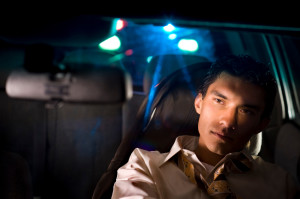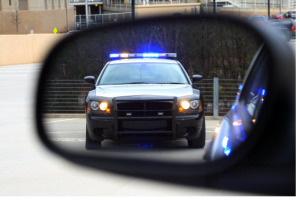What constitutes a “hit and run” charge and what can I do about it if I am charged with the crime of ”hit and run”? California Vehicle Code Section 20002(a) says: “The driver of any vehicle involved in an accident resulting only in damage to any property, including vehicles, shall immediately stop the vehicle at the nearest location that will not impede traffic… (and shall) locate and notify the owner or person in charge of that property of the name and address of the driver and owner of the vehicle involved and, upon locating the driver of any other vehicle involved or the owner or person in charge of any damaged property, upon being requested, present his or her driver’s license, and vehicle registration, to the other driver, or property owner…The information presented shall include the current residence address of the driver and of the registered owner.”
The statute also says: “Leave in a conspicuous place on the vehicle or other property damaged a written notice giving the name and address of the driver and of the owner of the vehicle involved and a statement of the circumstances thereof and shall without unnecessary delay notify the police department of the city wherein the collision occurred…”
This means that when you are in an accident on a road or highway you must stop as soon as it is safely possible to do so. You do not have the option of driving a mile away because that is where you felt most comfortable pulling over because you were familiar with the area and it was well lit. I have many clients who get charged with this crime and call my office and tell me that their home was only half a mile from the accident so they decided to drive home and then call law enforcement.
While this may be a mitigating factor, it is still in violation of existing law as stated. You must pull over and stop as soon as you can. You must also exchange information if the other party requests it. This means that if the other party does not request it, then you do not have to give them your information. Some people prefer to settle things informally and not notify insurance. This is completely acceptable as long as no one is injured, in which case you must notify law enforcement.
Sometimes my clients will ask me “What if I didn’t know that my car bumped into the other car? That would be a defense to the charge of “hit and run”. If there is no “hit” then there can be no “run”. But be aware that if there is substantial damage or even just enough damage to make it clear to a jury that your car was involved in an accident and
it can be proven that the accident took place with the other vehicle through paint transfer or surveillance video or other eyewitnesses, the case will probably be filed by the district attorney. Of course, every case is unique and as such an experienced attorney can give you advice on how to proceed.
I also have clients who tell me that they knew they were involved in an accident but didn’t stop because the accident was clearly not their fault and even all the other witnesses stated such and it was even stated in the police report that the accident was the fault of the other party and so why should I have the obligation to stop? Because the law says you do. The crime of misdemeanor Vehicle Code 20002(a) hit and run has nothing to do with who was at fault or who did or didn’t have insurance. You must always stop and then exchange information if the other party so requests.
Another question prospective clients ask me is “What if I got scared?
“I left because I was scared and I had no idea that the law said I had to stop.” While these are very plausible emotions and no doubt it is very stressful to be involved in a traffic accident none of these reasons rise to the level of a legal defense. Having said this, if the other party involved in the accident becomes so enraged to the point of assaulting you or threatening you with injury or death and from the totality of the facts apparent that by staying at the scene of the accident, you would be endangering your safety, then it makes legal sense to leave the scene and get to somewhere safe and contact law
enforcement as soon as possible. In any situation where you are in doubt as to whether you have fulfilled your legal obligations, a simple phone call to the police can make the difference between the DA filing your case or not or a guilty vs. not guilty verdict at trial.
Finally, if charges are filed by the District Attorney don’t feel that all is lost. It isn’t. Simply because the charges were filed doesn’t make them true. You still are entitled to a jury trial and the right to have your “day in court”. Remember, you don’t have to prove your innocence, the burden is on the prosecutor to prove your guilt beyond a reasonable doubt to all twelve members of the jury. Some of the issues we discussed above could lead to reasonable doubt and result in a not guilty verdict. Even if the facts are stacked against you it is still possible to get the charges reduced to an infraction or even dismissed completely. If you have no significant criminal history it is possible to resolve the matter pursuant to Penal Code 1377 & 1378. This section of the Penal Code allows the court to dismiss charges with the consent of the District Attorneys Office and only after the “victim” (the owner of the other vehicle involved in the hit and run) has provided proof to the court that all damages have been paid for.
To summarize, all criminal matters can have a substantial impact on your future. A hit and run are often accompanied by a three to six month suspension of your driver’s license. Always consult with a professional lawyer before you plead guilty to a misdemeanor Hit and Run charge.

